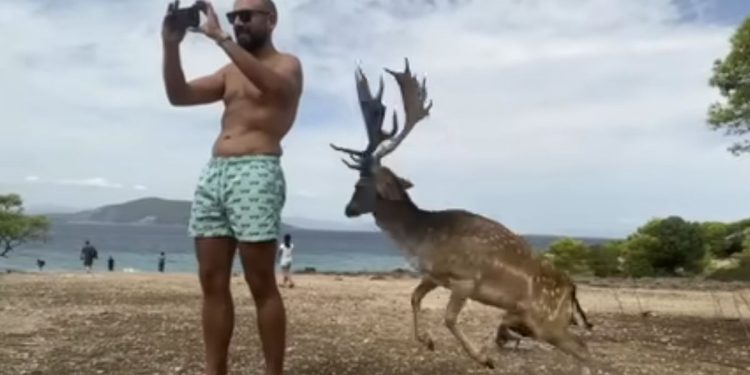One buck almost turned a man into a doe — a John Doe — in one recent viral video.
This belligerent Bambi rammed a tourist in the rib cage with his antlers as the unsuspecting shutterbug tried to snap a photo with the cloven clobberer.
A Mexican tourist, Gian Carlo Triacca, and his wife, Erika, were drawn to a group of deer, intending to capture a memorable moment on camera while vacationing in Greece, Metro reported. In an attempt to photograph one of the deer, Triacca found himself in a harrowing situation.
A seemingly innocuous act triggered an aggressive response from a deer, leading to a sudden and violent attack that left Triacca with broken ribs.
“He broke a couple of ribs and left me in a huge amount of pain for several days, but I was lucky my injuries weren’t worse,” Triacca said. “I didn’t go to the hospital. I just recovered by myself with lots of medication and ice.”
Erika Triacca, incidentally, managed to document the entire event, providing a disturbing visual account of the assault.
[firefly_embed]
[/firefly_embed]
Triacca’s peaceful vacation transformed into a painful ordeal, shedding light on the importance of respecting nature and its inhabitants, even when our intentions are benign.
Triacca’s experience is one of many high-profile animal attacks in the news in recent years–– and many of them stem from animals other than President Biden’s dog.
It called to mind the recent story regarding two college students who fought off grizzly bears in the Wyoming Mountains. Metro also reported that a diver off the coast of Egypt was headbutted by a shark.
A neighborhood in Portland was recently terrorized by a gang of raccoons. One unsuspecting woman who was texting and walking through the neighborhood was even challenged and attacked by one of the masked bandits.
[firefly_embed]
[/firefly_embed]
Even geese have been seen attacking those who draw too near. In one news story from Austin, two geese can be seen circling and pecking at a lonesome boy swimming in Barton Springs, a well-known Texas swimming hole. “People talk about cats being sort of pawns of the devil, I think it is geese,” one man who recorded the scuffle told a local Fox station.
[firefly_embed]
[/firefly_embed]
Even seemingly gentle animals can react aggressively when they perceive a threat. In this particular case, the deer’s response to Triacca’s approach resulted in an attack that left him injured: Not all deer are the collar-wearing “pet” deer of Missouri fame.
Tourists must exercise situational awareness when venturing into foreign environments. In the same way tourists may need to be cautious when engaging with unfamiliar local customs, foreign wildlife poses its own dangers and should be engaged with respect. Wild animals, including deer, should not be viewed as tourist attractions; they are to be approached with peace and prudence. Travelers should acknowledge their role as guests in these animals’ natural habitats, in the same way they are guests in a foreign land, and prioritize the safety and well-being of both themselves and the wildlife.
This also highlights the need for responsible wildlife photography. Just because you know that you are only taking a harmless photo, does not mean that the animal knows that. Animals think in primitive terms.
While wildlife encounters are a popular and exhilarating aspect of travel, they must be conducted responsibly to safeguard both humans and animals. Maintaining a safe distance and refraining from actions that could be perceived as threats is of paramount importance.
Triacca’s experience serves as a cautionary tale, reminding travelers that even animals need personal space sometimes. It underscores the value of respectful and responsible interaction with nature and its inhabitants. Although encounters with wildlife can be thrilling, nature, in all its magnificence, can be formidable, and it warrants continual airing on the side of caution.
Nature is constantly around us. Accordingly, we must give nature our constant respect and undivided attention.
This article appeared originally on The Western Journal.


























 Continue with Google
Continue with Google